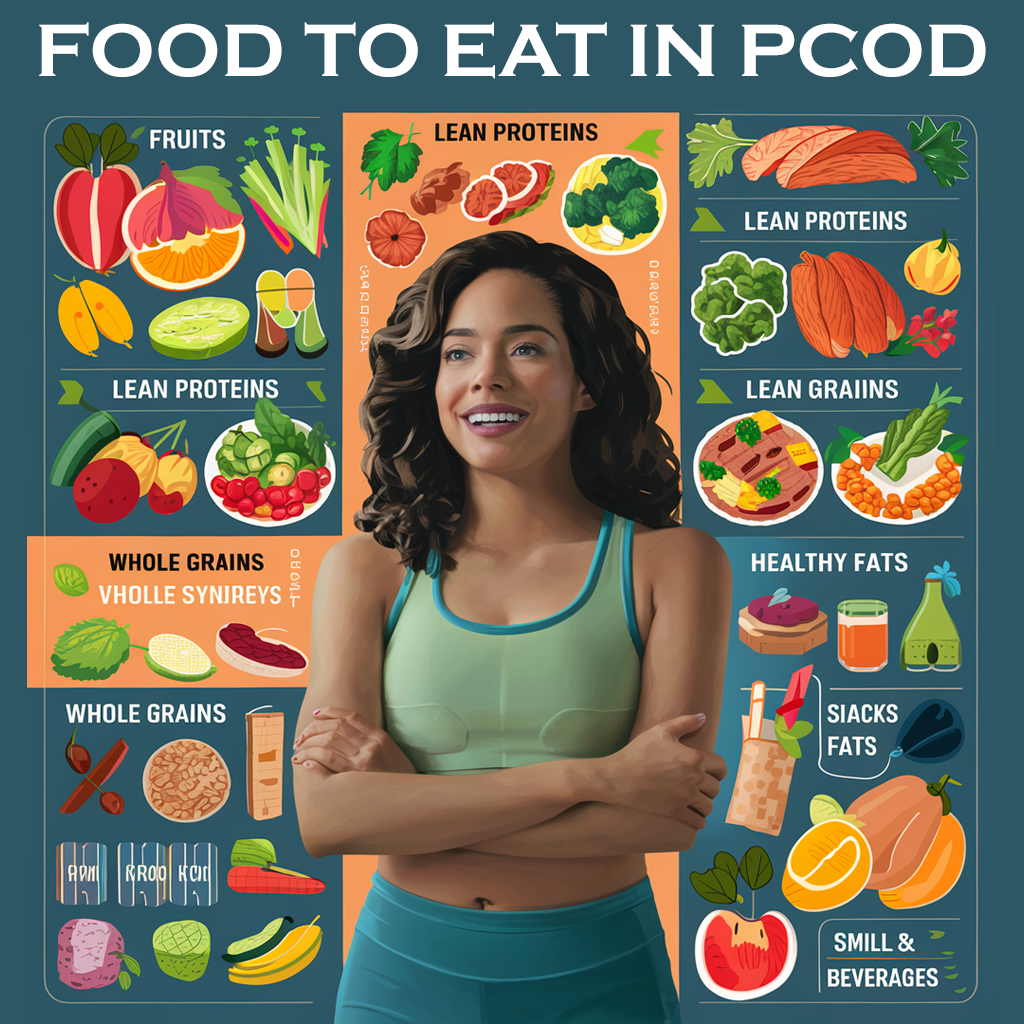PCOD Diet Chart for Weight Loss
Introduction
PCOD stands for Polycystic Ovary Syndrome, which is a common health condition that affects individuals with ovaries, primarily women of reproductive age. PCOD is characterized by hormonal imbalances, irregular menstrual cycles, and tiny, fluid-filled sacs (cysts) on the ovaries.
Managing PCOD typically involves a combination of lifestyle changes, such as a healthy diet, regular exercise, and medical interventions. Treatment aims to regulate menstrual cycles, manage symptoms like acne and hirsutism, and address long-term health risks such as diabetes and heart disease that may be associated with PCOD. If you suspect you have PCOD or are experiencing symptoms, it’s essential to consult with a healthcare professional for a proper diagnosis and personalized treatment plan.
Table of Contents
Understanding PCOD and Weight Loss
Polycystic Ovary Syndrome (PCOS) can present challenges when it comes to weight management. Individuals with PCOD often face hormonal imbalances, insulin resistance, and other factors that can contribute to weight gain. However, understanding the relationship between PCOD and weight loss can help develop effective strategies for managing both aspects of health.
It’s important to approach weight loss regarding overall health and well-being. Rather than focusing solely on the number on the scale, prioritizing lifestyle changes that promote hormonal balance, insulin sensitivity, and overall health can lead to more sustainable and holistic outcomes for individuals with PCOD. Always consult with healthcare professionals for personalized advice tailored to your specific situation.
PCOD Diet Plan for Weight Loss
For women with PCOD, it’s essential to follow a PCOD diet chart to ensure they get a balanced intake of all essential nutrients and a variety of foods. PCOD diet chart for weight loss should align with these guidelines while creating a caloric deficit based on individual BMI and BMR metrics.
Here, we designed a sample 7 days POCD diet chart for vegetarians & non-vegetarians.
POCD diet chart for Vegetarians
| BREAKFAST | LUNCH | SNACK | DINNER | |
| MONDAY | Poha with veggies & a glass of fresh orange juice | Brown rice, rasam & cabbage stir-fry | Low-glycemic fruits | Wheat dosa with roasted chana dal chutney |
| TUESDAY | Vegetable oats or dalia | Brown rice, beetroot poriyal, dal & curd | Roasted chana | Chapatis or rotis with vegetable kurma & salad |
| WEDNESDAY | Ragi Rava Dosal with mint chutney | Brown rice pulao with raita | Whole wheat bread with almond/peanut butter | Besan chilla with vegetables |
| THURSDAY | Vegetable Upma | Brown rice, sprouts curry, rasam & curd | Roasted Makhana or Foxnuts | Chapati or rotis with chana masala & green salad |
| FRIDAY | Brown rice idlis with coconut chutney | Daliya khichdi with vegetables & curd | A handful of peanuts or walnuts | Rotla with a bowl of sprouts |
| SATURDAY | Brocolli & gobi paratha | Brown rice, stir-fry spinach, moong sprouts & curd | Banana or any other fresh seasonal fruit | Chapatis or rotis with low-fat paneer curry & salad |
| SUNDAY | Ragi banana pancakes | Quinoa fried rice with vegetables, cashews & sesame seed | Baked vegetable cutlets or sweet potato tikkis | Bajra, moong & peas khichdi |
POCD diet chart for Non-Vegetarians
| BREAKFAST | LUNCH | SNACK | DINNER | |
| MONDAY | Multigrain chicken salad sandwich | Jeera Rice & Lentil Dal curry | Homemade Chakli | Chapati with carrot methi subzi |
| TUESDAY | Red rice adai with aviyal | Whole wheat pasta with vegetables | Millet cookies | Methi thepla with pickle & chutney |
| WEDNESDAY | Ragi Porridge | Appam with chicken stew | Whole-grain crackers with peanut butter | Grilled fish with avocado salad |
| THURSDAY | Whole wheat bread & egg white omelette with veggies | Oats, Vegetable & brown rice khichdi | Carrot sticks & Hummus | Chapati with green peas masala |
| FRIDAY | Soya Khaman Dhokla | Tomato rice, beetroot salad & curd | Masala peanuts | Grilled, roasted or homemade tandoori chicken with salad |
| SATURDAY | Onion & tomato Uttapam | Brown rice with fish curry & mixed sprouts subzi | Baked sweet potato fries | Chapati with egg curry |
| SUNDAY | Quinoa Upma | Chicken pulao with raita | Banana or any other fresh seasonal fruit | Chapati with whole masoor dal & bhindi sabji |
Key Takeaways
Maintaining a PCOD diet plan is a simple and effective way to manage your weight and regulate what you eat.
Your diet should include a variety of foods, such as green leafy vegetables, low glycemic fruits, and lean protein in sufficient amounts.
Additionally, following a PCOD diet chart for weight loss should be similar to a regular diet plan but with a specific caloric deficit based on your BMI and BMR measurements.
Food To Eat in PCOD?
While there’s no specific “PCOD diet,” incorporating a balanced and nutrient-rich eating plan can help manage symptoms associated with polycystic ovary syndrome (PCOS). Here are some foods that may be beneficial for individuals with PCOD.

- High-Fiber Foods:
- Eating foods that are high in fiber can improve your health by regulating your blood sugar levels and insulin sensitivity. Fiber-rich foods slow down the absorption of sugars, which prevents blood sugar spikes. Fiber also helps regulate insulin sensitivity, which is important because it regulates blood sugar levels. A diet that includes whole grains like brown rice and whole-wheat bread, legumes such as lentils and chickpeas, and fruits and vegetables like apples, carrots, and berries can increase your fiber intake. This can help regulate blood sugar levels and improve your overall health.
- Lean Proteins:
- To keep your diet healthy and balanced, it’s important to eat lean protein from sources like poultry, fish, tofu, tempeh, legumes, and beans. Lean protein helps your body build and feel full, which can stop overeating. Additionally, protein helps keep blood sugar levels stable, which is essential for people with diabetes or those at risk. Choosing lean protein means you get the nutrients your body needs to stay healthy and whole.
- Healthy Fats:
- Fatty fish like salmon, mackerel, and sardines are healthy to eat because they contain omega-3 fatty acids. Our bodies cannot produce these essential fats, so we must get them from our food. Omega-3s have anti-inflammatory properties that help us stay healthy and decrease our risk of chronic diseases.
- Omega-3s may also help regulate menstrual cycles and reduce premenstrual syndrome (PMS) symptoms. Eating fish that are rich in omega-3s, like salmon, mackerel, and sardines, may result in less painful menstrual cramps and mood swings, along with a more regular menstrual cycle.
- Including fatty fish in your diet can provide many health benefits, including better menstrual health.
- Colorful Vegetables:
- Including colorful, non-starchy vegetables in your diet is essential for good health. They offer essential nutrients, antioxidants, and fiber while being low in calories. Regular intake can help maintain a healthy weight, reduce the risk of chronic diseases, and improve digestion. So, incorporate a variety of non-starchy vegetables like leafy greens, broccoli, carrots, and peppers to enjoy their benefits.
- Low-Glycemic Fruits:
- When it comes to fruits, choosing the right ones can make a significant impact on your blood sugar levels. To keep your sugar levels in check, it’s recommended to opt for low-glycemic fruits like berries, cherries, and apples. These fruits are known to have a slower effect on your body’s blood sugar levels and can help you maintain a healthy blood sugar level. So, next time you go fruit shopping, remember to choose the low-glycemic ones to keep your health in check.
- Probiotic-Rich Foods:
- Probiotic-rich foods like yogurt, kefir, sauerkraut, and kimchi can help restore the natural balance of good bacteria in your gut. Incorporating these foods into your regular diet can promote healthy digestion and boost your immune system. Remember to consume them regularly for the most benefit. Consult with your healthcare provider before taking probiotic supplements.
- Anti-Inflammatory Foods:
- PCOS causes inflammation. Eating anti-inflammatory foods like turmeric, ginger, garlic, and green leafy veggies can help reduce inflammation and ease symptoms. Incorporating these foods into your diet is an effective way to manage inflammation associated with PCOD.
- Cinnamon:
- Some studies have shown that consuming cinnamon may help improve insulin sensitivity, which is important for regulating blood sugar levels. This is because cinnamon can stimulate insulin receptors and increase the absorption of glucose by cells, leading to better insulin sensitivity. To potentially improve your insulin sensitivity and maintain healthy blood sugar levels, consider adding cinnamon to your meals or beverages.
- Spearmint Tea:
- Studies have shown that spearmint tea may reduce androgen levels in women with PCOS, a hormonal disorder that can cause symptoms like acne, excessive hair growth, and irregular menstrual cycles. While it can be a helpful addition to your diet, it’s important to talk to your healthcare provider before making any significant changes to your lifestyle.
- Chromium-Rich Foods:
- If you want to manage your blood sugar levels, you may want to consider eating foods that are rich in chromium, such as broccoli, green beans, and whole grains. Chromium is a mineral that is important for regulating insulin levels in your body. By incorporating chromium-rich foods into your diet, you can help improve your body’s response to insulin, which can help regulate your blood sugar levels and prevent insulin resistance.
- InsertRetry
- Chia Seeds and Flaxseeds:
- Chia seeds and flaxseeds are small but powerful superfoods that are rich in nutrients. They contain fiber and omega-3 fatty acids, which are important for good health. Eating these seeds may help to balance hormones. Chia and flaxseeds also have antioxidants and plant-based protein, making them a healthy addition to your meals and snacks. To improve your overall health, try incorporating chia and flaxseeds into your diet.
Foods To Avoid in POCD:

- Highly Processed Foods:
- PCOD is a condition that affects women of childbearing age. Eating foods high in refined carbs, added sugars, and processed ingredients can worsen insulin resistance, which is a common issue in women with PCOS. To prevent problems, women with PCOS should eat a healthy diet that is low in refined carbs, added sugars, and processed foods.
- Sugary Foods and Beverages:
- To improve your health, it’s important to watch your sugar intake. Sugary foods and drinks like soda, candy, pastries, and sweets can cause weight gain and insulin resistance. This can lead to serious health problems like type 2 diabetes, heart disease, stroke, and kidney disease.
- To reduce your sugar intake, avoid processed foods and choose fresh fruits, vegetables, and whole grains. Also, limit sugary drinks and choose water, herbal tea, or unsweetened coffee instead. Reducing your sugar intake is good for your health.
- Refined Carbohydrates:
- Choose whole grains like brown rice, quinoa, and whole wheat products over refined carbs like white bread, pasta, and white rice. Whole grains are rich in nutrients and fiber and have a lower impact on blood sugar levels, making them a healthier choice.
- Dairy with Added Hormones:
- If you have polycystic ovary syndrome (PCOS), it’s recommended that you avoid dairy products that have added hormones. These hormones can worsen your hormone imbalance. Instead, consider opting for dairy products that are hormone-free or organic. Hormone-free products are derived from cows that are not given any hormones to produce more milk. Organic products come from cows that are fed organic food and do not receive antibiotics or hormones. By choosing hormone-free or organic dairy products, you can help to maintain balanced hormones and reduce the risk of exacerbating your PCOS.
- Red Meat and Processed Meats:
- Eating a lot of red meat and processed meat can cause inflammation and insulin resistance, leading to health problems like diabetes, heart disease, and arthritis. To stay healthy, it is better to eat lean protein sources like poultry, fish, beans, and legumes instead of red meat and processed meat. These foods are healthier and provide essential nutrients. It is important to limit your intake of red meat and processed meat as much as possible.
- Trans Fats:
- To keep your heart healthy, it’s important to avoid certain kinds of fats called trans fats. You can find these fats in fried foods and baked goods that use some oils. Overeating these fats can harm your heart and make you more likely to get sick. So, the best way to keep your heart healthy is to avoid eating foods that have trans fats.
- Caffeine and Alcohol:
- While it is safe for some people to consume moderate amounts of caffeine and alcohol, consuming excessive amounts of these substances can disrupt the natural balance of hormones in the body, leading to negative effects on insulin sensitivity. Therefore, it is recommended that individuals consume these substances in moderation to avoid any potential negative health effects.
- Soy Products:
- Some studies suggest that the excessive intake of soy products can disrupt the hormonal balance in the body, leading to potential health problems. However, a balanced diet that includes moderate consumption of whole soy foods like tofu and edamame can provide valuable nutrients and health benefits. It’s important to consider including soy foods in moderation as part of a healthy and varied diet.
- Artificial Sweeteners:
- Several studies have suggested that consuming artificial sweeteners may have an impact on our body’s insulin sensitivity and gut microbiota. Therefore, it’s recommended to limit the use of artificial sweeteners and instead opt for natural sweeteners in moderation. This can help maintain a healthy balance in our body and promote overall well-being.
- Excessive Salt:
- When you consume a diet that is high in sodium, it can cause your body to retain water, leading to a bloated feeling. To avoid this, it is recommended that you reduce your salt intake and focus on eating fresh, whole foods. By doing this, you can help prevent water retention and bloating, which can make you feel more comfortable and improve your overall health.
Exercise for PCOD

Apart from a healthy diet, doctors often recommend exercise and physical activity as highly recommended lifestyle changes for women suffering from PCOD.
As sedentary behavior and obesity increase a woman’s risk of developing and complicating symptoms of PCOD, a weight loss diet plan for PCOD and exercise are some of the best ways to counteract the unhealthy consequences of this condition.
1. Regular Exercise
For women suffering from PCOD, maintaining a healthy weight is a precedence for managing the condition. Regular exercise is, accordingly, both effective and essential.
For those with PCOD, a balanced Indian diet can complement regular exercise such as brisk walking, cycling, jogging, or swimming. These exercises help reduce insulin resistance, aid in weight loss, boost fertility and enhance symptoms of depression and anxiety.
It’s recommended that women with PCOD do at least 30 minutes of moderate physical exercise 5 days a week. Strength training and core strength exercises are also recommended daily to boost metabolism, build body mass, and alleviate symptoms like lower back pain.
2. Yoga
Along with PCOS diet and exercise, yoga is a complementary practice that’s found to be gradually helpful for promoting hormonal balance, managing and enhancing anxiety, and managing blood sugar.
Conclusion
Polycystic Ovary Syndrome (PCOS) is a condition that lasts for a lifetime. Although there is still no apparent cure or treatment for the condition, various ways can be implemented to manage and control it. The most effective way to treat PCOD is by determining the diet and lifestyle changes that will yield positive results.
The symptoms and severity of PCOD vary among women, making it challenging to find a one-size-fits-all approach to treatment. However, healthy eating habits and regular exercise can help prevent long-term complications associated with PCOD.


